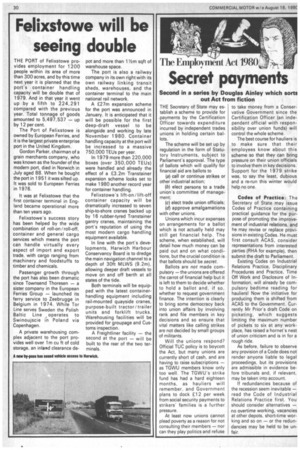Secret payments
Page 32

If you've noticed an error in this article please click here to report it so we can fix it.
Second in a series by Douglas Ainley which sorts out Act from fiction
THE Secretary of State may establish a scheme to provide for -payments by the Certification Officer towards expenditure incurred by independent trades unions in holding certain ballots.
The scheme will be set up by regulation in the form of Statutory Instruments, subject to Parliament's approval. The type of ballots which will qualify for financial aid are ballots to (a) call or continue strikes or other industrial action; (b) elect persons to a trade union's committee of management; (c) elect trade union officials; (d) approve amalgamations with other unions.
Unions which incur expenses on arrangements for a ballot which is not actually held may still get financial help. The scheme, when established, will detail how much money can be paid out and on what conditions, but the crucial condition is that ballots should be secret.
Ballots are not made compulsory — the unions are offered the carrot of financial help but it is left to them to decide whether to hold a ballot and, if so, whether to request government finance. The intention is clearly to bring some democracy back into union affairs by involving rank and file members in key decisions and so ensure that vital matters like calling strikes are not decided by small groups of militants.
Will the unions respond? Official TUC policy is to boycott the Act, but many unions are currently short of cash, and are having to raise subscriptions — as TGWU members know only too well. The TGWU's strike fund has had a hard eighteen months, as hauliers will remember, and Government plans to dock Cl 2 per week from social security payments to strikers' families is a further pressure.
At least now unions cannot plead poverty as a reason for not consulting their members — nor can they play politics and refuse to take money from a Conservative Government since the Certification Officer (an independent official with responsibility over union funds) will control the whole scheme.
The best course for hauliers is to make sure that their employees know about this scheme so that they can bring pressure on their union officials to involve them in key decisions. Support for the 1979 strike was, to say the least, dubious and a re-run this winter would help no one.
Codes of Practice; The Secretary of State may issue Codes of Practice containing practical guidance for the purpose of promoting the improvement of industrial relations, and he may revise or replace provisions in existing Codes. He must first consult ACAS, consider representations from interested parties (RHA for example), then submit the draft to Parliament.
Existing Codes on Industrial Relations Practice, Disciplinary Procedures and Practice, Time Off Work and Disclosure of Information, will already be compulsory bedtime reading for hauliers! Now the initiative for producing them is shifted from ACAS to the Government. Currently Mr Prior's draft Code on picketing, which suggests limiting the maximum number of pickets to six at any workplace, has raised a hornet's nest of union criticism and is in for a rough ride.
As before, failure to observe any provision of a Code does not render anyone liable to legal proceedings, but its provisions are admissible in evidence before tribunals and, if relevant, may be taken into account.
If redundancies because of the recession seem inevitable — read the Code of Industrial Relations Practice first. You should consider alternatives — no overtime working, vacancies at other depots, short-time working and so on — or the redundancies may be held to be unfair.












































































































